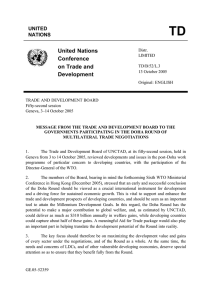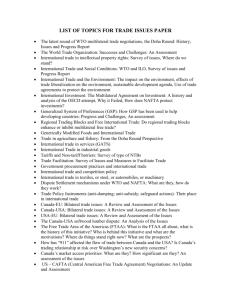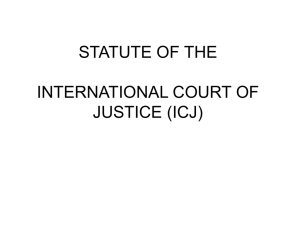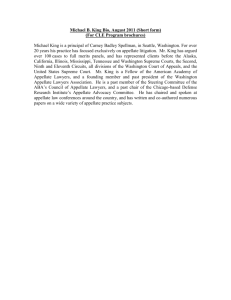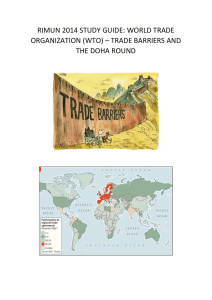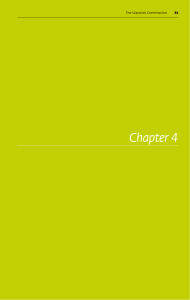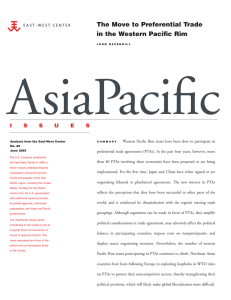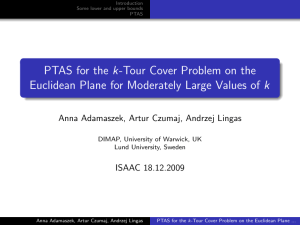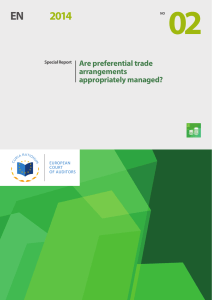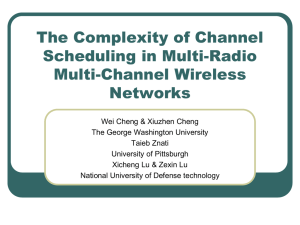CGD Notes U.S. Trade Policy: Don’t Leave Poor Countries Behind
advertisement
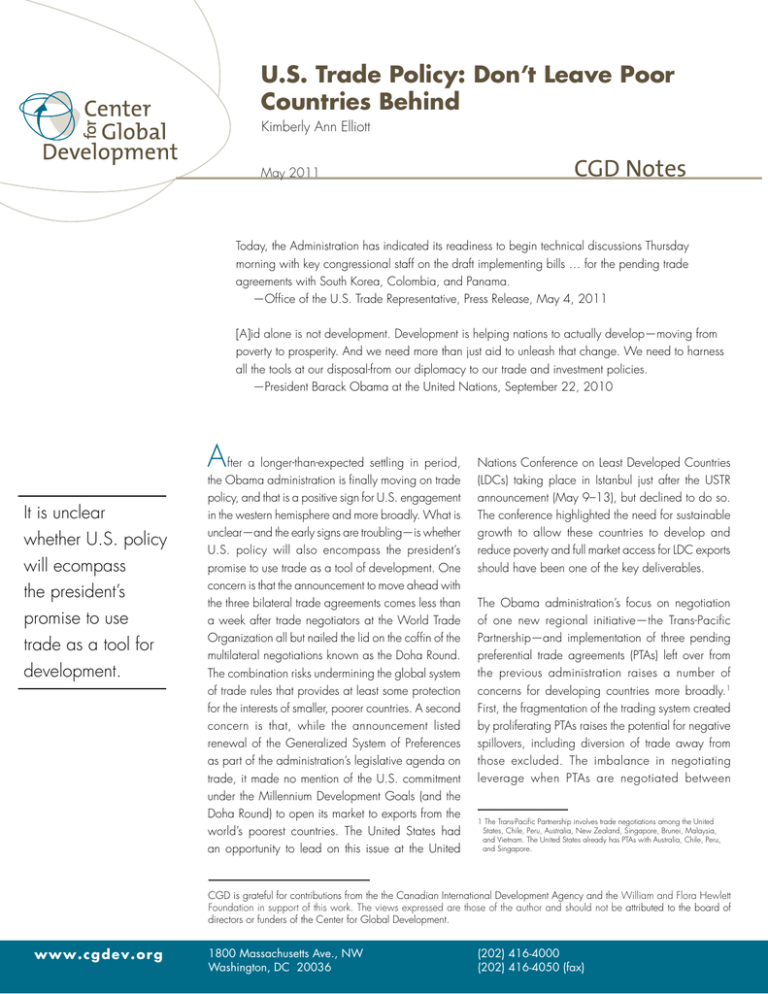
U.S. Trade Policy: Don’t Leave Poor Countries Behind Kimberly Ann Elliott May 2011 CGD Notes Today, the Administration has indicated its readiness to begin technical discussions Thursday morning with key congressional staff on the draft implementing bills … for the pending trade agreements with South Korea, Colombia, and Panama. ­—Office of the U.S. Trade Representative, Press Release, May 4, 2011 [A]id alone is not development. Development is helping nations to actually develop—moving from poverty to prosperity. And we need more than just aid to unleash that change. We need to harness all the tools at our disposal-from our diplomacy to our trade and investment policies. ­—President Barack Obama at the United Nations, September 22, 2010 A It is unclear whether U.S. policy will ecompass the president’s promise to use trade as a tool for development. fter a longer-than-expected settling in period, the Obama administration is finally moving on trade policy, and that is a positive sign for U.S. engagement in the western hemisphere and more broadly. What is unclear—and the early signs are troubling—is whether U.S. policy will also encompass the president’s promise to use trade as a tool of development. One concern is that the announcement to move ahead with the three bilateral trade agreements comes less than a week after trade negotiators at the World Trade Organization all but nailed the lid on the coffin of the multilateral negotiations known as the Doha Round. The combination risks undermining the global system of trade rules that provides at least some protection for the interests of smaller, poorer countries. A second concern is that, while the announcement listed renewal of the Generalized System of Preferences as part of the administration’s legislative agenda on trade, it made no mention of the U.S. commitment under the Millennium Development Goals (and the Doha Round) to open its market to exports from the world’s poorest countries. The United States had an opportunity to lead on this issue at the United Nations Conference on Least Developed Countries (LDCs) taking place in Istanbul just after the USTR announcement (May 9–13), but declined to do so. The conference highlighted the need for sustainable growth to allow these countries to develop and reduce poverty and full market access for LDC exports should have been one of the key deliverables. The Obama administration’s focus on negotiation of one new regional initiative—the Trans-Pacific Partnership—and implementation of three pending preferential trade agreements (PTAs) left over from the previous administration raises a number of concerns for developing countries more broadly.1 First, the fragmentation of the trading system created by proliferating PTAs raises the potential for negative spillovers, including diversion of trade away from those excluded. The imbalance in negotiating leverage when PTAs are negotiated between 1 The Trans-Pacific Partnership involves trade negotiations among the United States, Chile, Peru, Australia, New Zealand, Singapore, Brunei, Malaysia, and Vietnam. The United States already has PTAs with Australia, Chile, Peru, and Singapore. CGD is grateful for contributions from the the Canadian International Development Agency and the William and Flora Hewlett Foundation in support of this work. The views expressed are those of the author and should not be attributed to the board of directors or funders of the Center for Global Development. www.cgdev.org 1800 Massachusetts Ave., NW Washington, DC 20036 (202) 416-4000 (202) 416-4050 (fax) CGD Notes countries that are asymmetric in size and power also often leads to the inclusion of provisions that are potentially inconsistent with development goals, such as stricter rules for intellectual property protection or restrictions on the use of capital controls. Opening the U.S. market to the world’s least developed countries would promote national interests at little or no cost and help to restore American leadership on trade. But the administration’s focus on PTAs is especially worrying given the apparent failure of the Doha Round of international trade negotiations. A successful round would help to mitigate the distorting effects of preferential agreements by bringing down trade barriers generally. Failure to conclude the round will likely spur further proliferation of PTAs and undermine the WTO’s credibility. While not perfect, the system of WTO rules and the Dispute Settlement Understanding created to enforce them are the only protection that smaller, weaker developing countries have from discrimination and bullying by their trading partners. Sadly, recent U.S. actions also risk undermining the WTO’s dispute settlement system through a petty and short-sighted snub. By tradition, the United States, along with Japan and the European Union, always has a national on the appellate body that reviews decisions by dispute settlement panels when requested. Also by tradition, members of the appellate body that indicate a willingness to continue to serve after their initial term are generally reappointed. Ignoring this tradition, the Obama administration declined to renominate Jennifer Hillman for the appellate body this year, reportedly out of pique over several decisions that had gone against the United States.2 The administration will thus lose Hillman’s extensive skills and experience and, more disturbing, it risks politicizing an institution that is widely respected as an independent, impartial, and technically competent arbiter. Of course the focus of U.S. trade policy must be to promote national interests. But an enforceable, rulesbased system is as much in America’s interest today as it was when U.S. policymakers helped create it, even if it is slower and more cumbersome than they would wish. And, increased prosperity and stability in poor countries is also in the U.S. interest, economically and politically. Opening the U.S. market to the world’s least developed countries, which collectively account for less than one percent of non-oil U.S. imports, would promote those interests at little or no cost and help to restore American leadership on trade. But will that be the direction the administration takes? 2 “USTR Blocks Hillman’s Bid For Second WTO Appellate Body Term,” Inside U.S. Trade, April 29, 2011 (subscription required), http://insidetrade.com/ Inside-US-Trade/Inside-US-Trade-04/29/2011/ustr-blocks-hillmans-bid-forsecond-wto-appellate-body-term/menu-id-172.html. 2 www.cgdev.org 1800 Massachusetts Ave., NW Washington, DC 20036 (202) 416-4000 (202) 416-4050 (fax)
